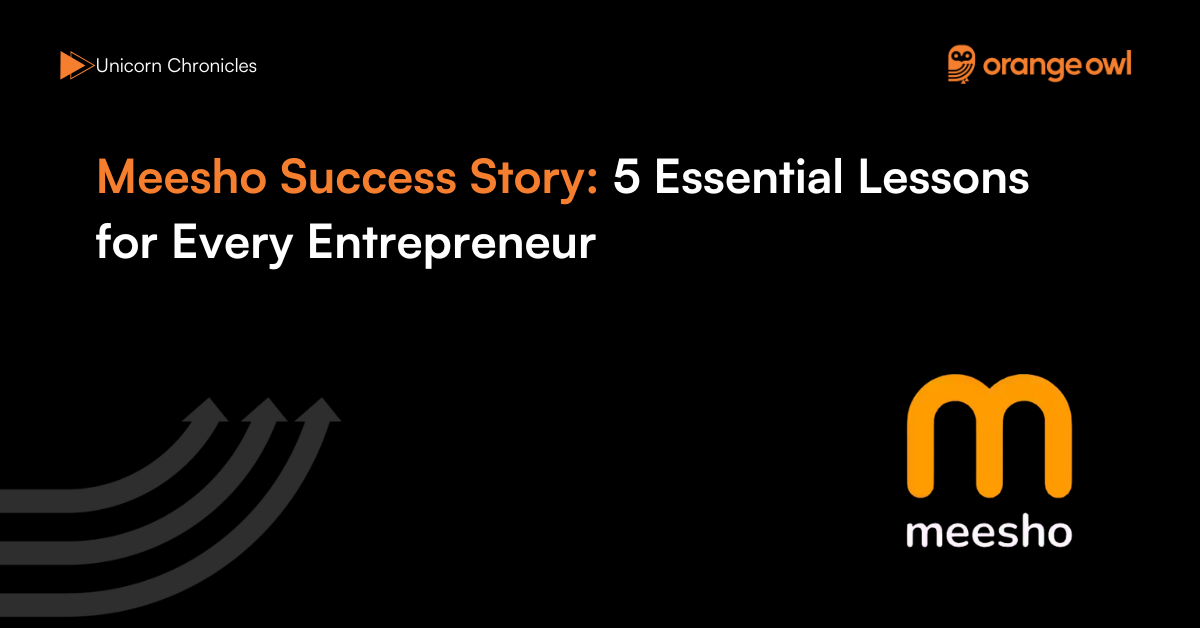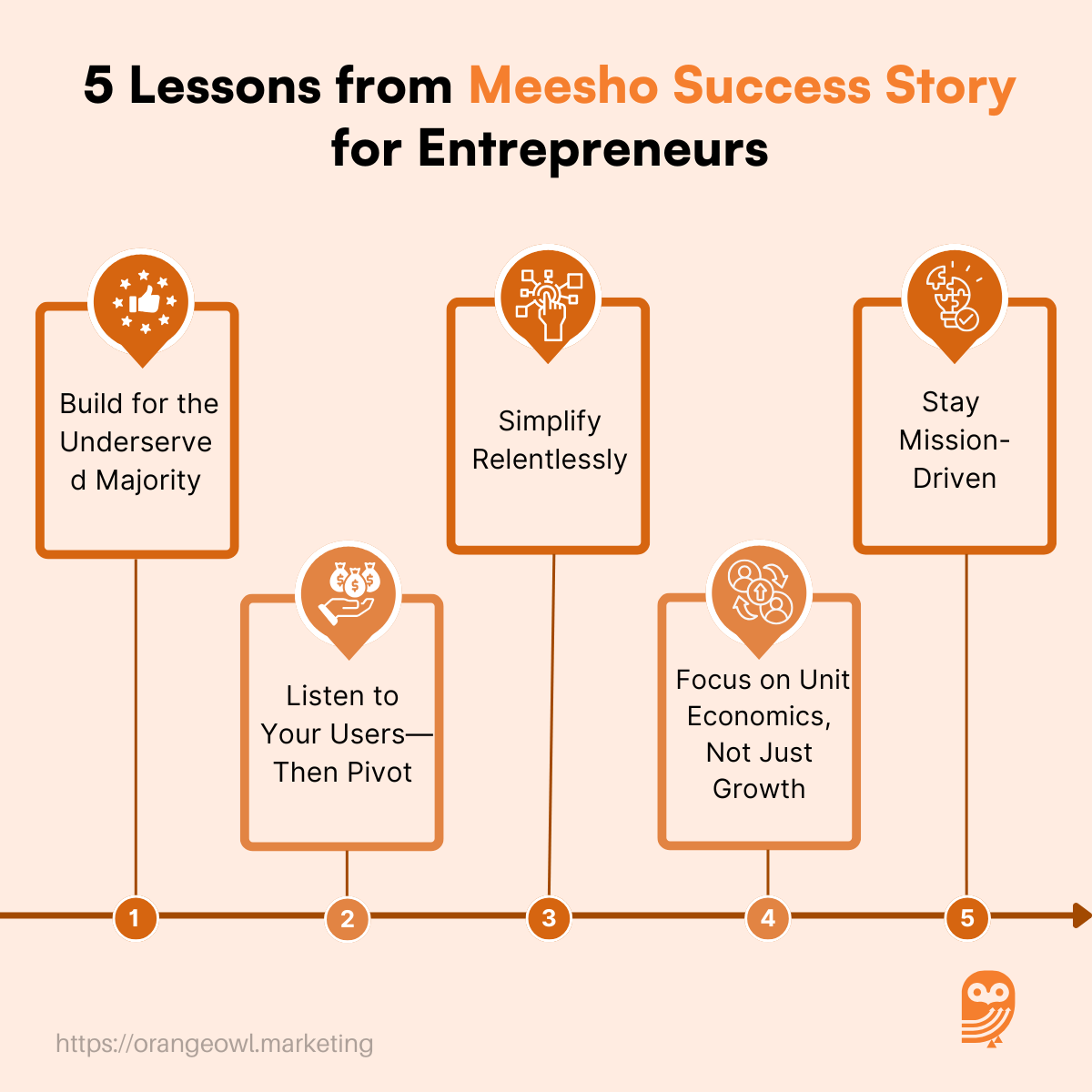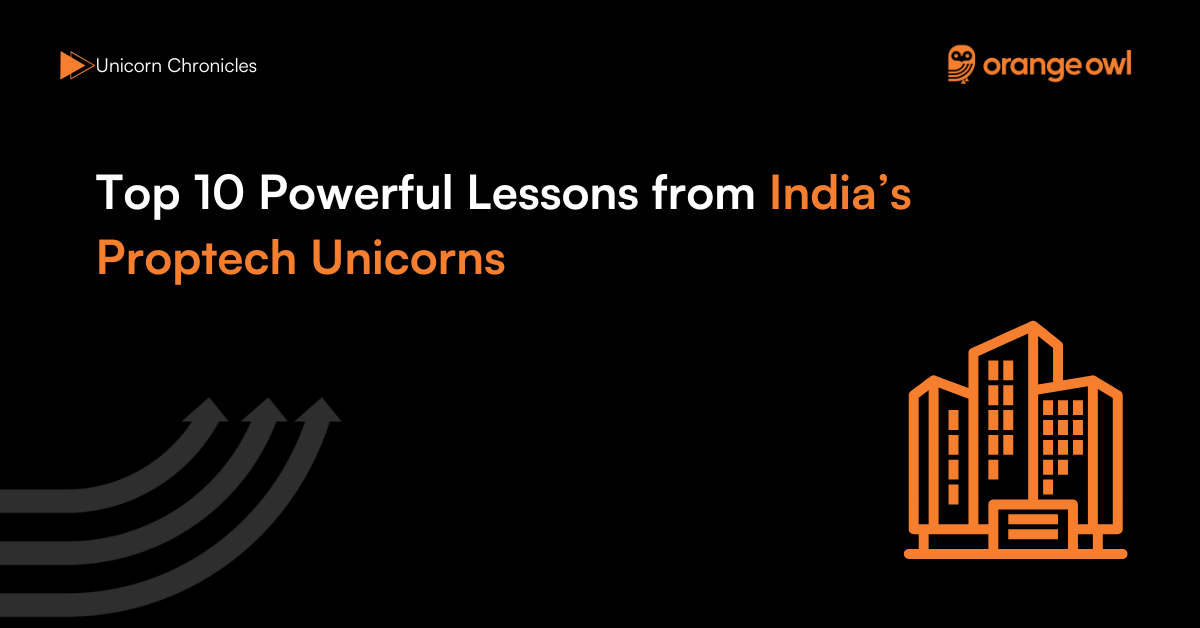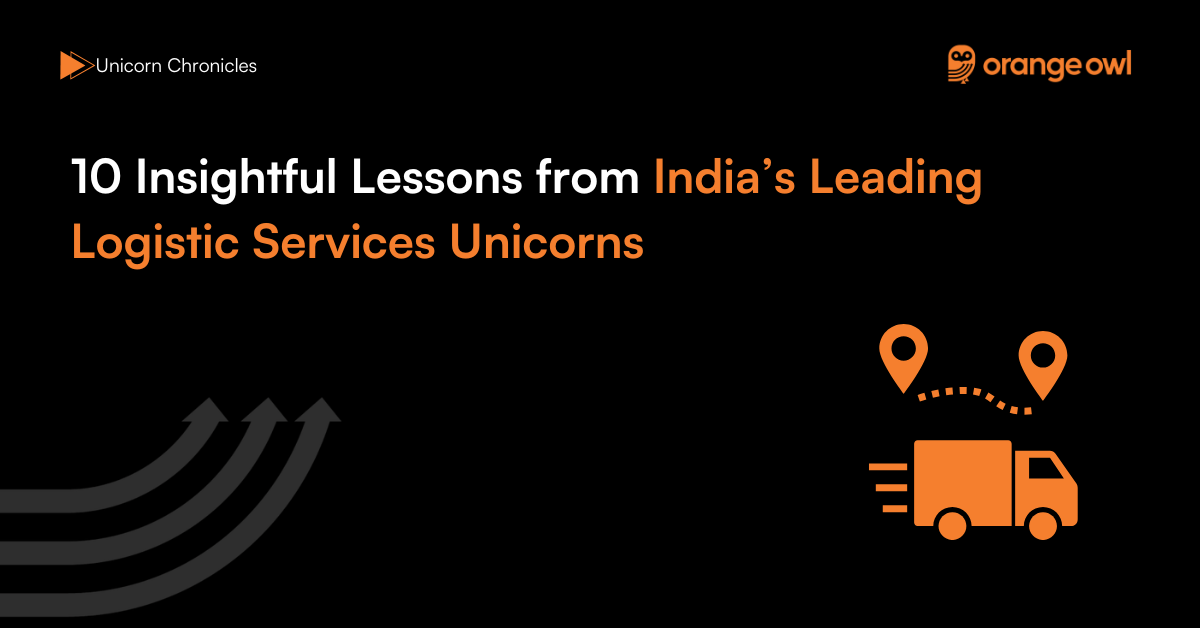Meesho Success Story: 5 Essential Lessons for Every Entrepreneur
Vivek Goel
May 19, 2025

Table of Contents
Introduction
In 2015, IIT Delhi alumni Vidit Aatrey and Sanjeev Barnwal founded Meesho—short for “Meri Shop”—with a bold vision: to empower every Indian, regardless of income or background, to start a business with zero investment. They launched Meesho as a social commerce platform leveraging WhatsApp, Facebook, and Instagram, enabling individuals—especially homemakers and small-town entrepreneurs—to establish their own online stores.
“We wanted to create entrepreneurs at scale, especially women entrepreneurs. We asked ourselves—how can we democratize entrepreneurship in India?” — Vidit Aatrey, CEO, Meesho
This mission has resonated across the nation. As of December 2024, Meesho boasts approximately 187 million unique annual transacting users, reflecting a 26% growth from the previous year. Notably, around half of this user base hails from Tier 4 and smaller towns like Naidupeta (Andhra Pradesh), Sherghati (Bihar), and Harapanahalli (Karnataka) . This widespread adoption underscores Meesho’s commitment to inclusivity and its role in introducing many to e-commerce for the first time.
This remarkable growth and outreach exemplify Meesho’s success in democratizing entrepreneurship and transforming the e-commerce landscape in India.
Origin Story
Meesho’s journey didn’t begin with the idea of reselling—it started as a platform to help small, offline businesses go online. In its earliest iteration, Meesho built a simple tool to help local stores digitize their inventory and create an online presence.
However, after extensive user interaction and months of real-time feedback, the team noticed an unexpected trend: it wasn’t the traditional store owners who were the most active users of the tool—it was women, especially homemakers in Tier II and Tier III cities, who were leveraging it to sell products within their social circles.
“We saw women in Tier II and Tier III cities using our tool to sell via WhatsApp. That’s when it clicked—there’s an untapped opportunity to build for this new kind of entrepreneur.”— Vidit Aatrey, Co-founder & CEO, Meesho
This moment of clarity sparked a pivotal shift in Meesho’s business model—from an online storefront builder to a social commerce platform designed around resellers. These women weren’t just hobbyists; they were ambitious entrepreneurs who needed a simple, zero-investment way to earn and scale. Meesho became the bridge, providing them with product catalogs, logistics, payment support, and training.
Today, this pivot is seen as one of the most influential in India’s startup ecosystem—one that catalyzed the birth of over 13 million digital entrepreneurs across the country.
Business Landscape and Challenges
When Meesho entered the market, the Indian e-commerce space was dominated by big players like Amazon and Flipkart, who catered primarily to urban, English-speaking, tech-savvy consumers. Meesho, on the other hand, decided to go after a largely ignored demographic—“Bharat,” or the 500 million+ Indians in smaller towns and rural areas.
“We realized that India is not one market. It’s a set of multiple small markets, each with their own needs and constraints.”— Vidit Aatrey
This insight became Meesho’s competitive advantage. While other platforms focused on speed and premium offerings, Meesho focused on simplicity, affordability, and trust—crucial pillars for onboarding first-time digital users.
Yet the road was anything but easy. The biggest challenge wasn’t competition—it was building trust at scale. Many resellers had never run a business before. Many customers had never shopped online. Questions about product quality, refunds, delayed deliveries, and digital payments were rampant.
“Our users are coming online for the first time, so we had to build a product that’s extremely simple, frictionless, and requires no prior knowledge of e-commerce.”— Vidit Aatrey
Meesho addressed these challenges with innovations like cash-on-delivery, no-questions-asked return policies, vernacular support, and educational content to train resellers. It wasn’t just building an app—it was building an ecosystem of trust, habit, and opportunity for millions of first-time internet users.
As a result, Meesho didn’t just survive the competition—it thrived by creating a category of its own: social-first commerce for middle and lower-income India.
Growth Strategies
Meesho’s unprecedented scale was not driven solely by capital or aggressive advertising—it was rooted in empathy-driven innovation and deep understanding of its core audience. The company reimagined how e-commerce could work for India’s next billion users and implemented five key growth strategies that transformed everyday individuals into digital entrepreneurs.
1. Social Commerce Model:
Meesho pioneered a reseller-driven social commerce model, enabling individuals—especially homemakers and unemployed youth—to resell a wide variety of products via platforms like WhatsApp, Facebook, and Instagram. This model allowed users to build trust-based, hyperlocal relationships with their customer base, often comprised of family, friends, and neighbors. The simplicity of sharing catalogs, collecting orders, and earning margins made it a zero-risk entrepreneurship opportunity.
“The goal was to empower a woman in a small town to start a business from her phone—without investing a rupee in inventory or logistics.” — Vidit Aatrey
2. Zero Commission Policy:
In 2021, Meesho took a bold step that shook up the seller ecosystem—it became the first Indian e-commerce platform to eliminate commission fees for sellers. This made Meesho an even more attractive platform for small businesses, artisans, and resellers who were previously discouraged by high commission cuts on other platforms. The move also catalyzed a surge in seller registrations and product listings, increasing inventory diversity.
3. Vernacular and Mobile-First Design:
Meesho’s user interface was intentionally designed to suit low-end smartphones and low-bandwidth environments, a reality for many users in rural India. The app supports over 10 Indian languages, reducing digital friction and making it accessible to non-English-speaking audiences. By prioritizing a mobile-first, intuitive design, Meesho ensured that even first-time internet users could navigate, sell, and earn with ease.
“We optimized for low bandwidth and a simple interface—because our users aren’t tech-savvy, but they are ambitious.” — Vidit Aatrey
4. Community-Based Grocery Model:
Entering the grocery segment—India’s largest retail category—Meesho innovated by aggregating orders from communities and delivering them in bulk through local hubs. Instead of mimicking urban-centric players like BigBasket or Blinkit, Meesho focused on affordability and access. They created a hyperlocal distribution system that drastically reduced delivery costs, making grocery delivery feasible even in price-sensitive markets.
“When we started doing grocery, we didn’t want to be like BigBasket. We asked—how can we do this at a price that works for a rural Indian consumer?”— Vidit Aatrey
5. Data-Driven Hyperlocal Insights:
Meesho heavily relies on data science to customize user experiences based on hyperlocal preferences. Through behavioral insights, the platform identifies product categories that sell best in specific regions, tailors pricing, and even personalizes logistics to improve delivery timelines. This localization strategy helped them penetrate Tier II, III, and IV cities where personalization matters more than speed or brand name.
Marketing Strategy
Meesho’s marketing strategy aligned deeply with its core mission—to democratize entrepreneurship and bring e-commerce to the masses. Instead of aspirational urban narratives, Meesho’s campaigns spotlighted real stories of real sellers who changed their lives using the app. These sellers, many of whom were first-time earners in their families, became the face of the brand in regional campaigns.
Their marketing approach combined micro-influencer partnerships, particularly in vernacular content spaces, with testimonial-driven storytelling. Social proof—showcasing how thousands had succeeded using Meesho—became a critical trust builder. In rural markets, where word of mouth still reigns supreme, these authentic stories resonated more than celebrity endorsements.
“Every marketing campaign was built to answer one question: Can we show someone like you who succeeded with Meesho?” — Vidit Aatrey
By focusing on affordability, inclusivity, and trust, Meesho not only onboarded millions of users but also made them advocates of the platform—fueling organic growth and deeper user engagement.
5 Essential Lessons for Every Entrepreneur
Meesho’s meteoric rise from a modest startup to a multi-billion-dollar social commerce giant offers valuable lessons for entrepreneurs everywhere. Here are five essential insights drawn from their journey, with founder Vidit Aatrey’s wisdom illuminating each:
1. Build for the Underserved Majority
Meesho’s strategic focus on Tier II and Tier III cities proved a groundbreaking truth: the biggest opportunities lie beyond India’s top 1% urban consumers. By tapping into millions of aspiring entrepreneurs in smaller towns and rural areas, Meesho unlocked an underserved market hungry for economic empowerment. This approach taught the world that real scale comes from inclusivity.
“India is not just metros and big cities. The vast majority of Indians live in smaller towns. Build for them, and you will unlock unprecedented growth.”— Vidit Aatrey
2. Listen to Your Users—Then Pivot
The founders’ willingness to pivot from digitizing offline stores to enabling reselling via social platforms was a game changer. Rather than rigidly adhering to their original business model, they carefully observed user behavior and adapted to meet emerging needs. This user-first mindset helped Meesho remain relevant and scale fast.
“The pivot came when we saw women using WhatsApp to sell products. That insight changed our entire trajectory.”— Vidit Aatrey

3. Simplify Relentlessly
At the heart of Meesho’s success is a relentless focus on simplicity—making the experience intuitive for first-time internet users who often have limited digital literacy. From the app’s vernacular support to frictionless onboarding and order management, every touchpoint was engineered to remove complexity for sellers and buyers alike. This ease of use fueled widespread adoption.
“If your product isn’t simple, it won’t work for Bharat. We obsess over making every step easy and understandable.”— Vidit Aatrey
4. Focus on Unit Economics, Not Just Growth
Scaling rapidly is important, but Meesho’s leaders emphasized building a sustainable business with healthy unit economics from day one. This approach was particularly evident in their grocery venture, where they innovated with hyperlocal bulk deliveries to control costs and improve margins. This financial discipline sets Meesho apart in an era when growth is often prioritized over profitability.
“The India opportunity is massive, but you have to build in a way that unit economics works from Day 1.”— Vidit Aatrey
5. Stay Mission-Driven
Meesho’s core mission—“entrepreneurship for all”—served as a guiding star through every decision, product iteration, and market challenge. This clarity of purpose helped the company maintain alignment internally and communicate authenticity externally. By keeping the mission front and center, Meesho built a loyal community of resellers and buyers who share the vision of economic empowerment.
“Our mission is to enable 100 million small businesses to succeed online. That’s what drives every decision we make.” — Vidit Aatrey
Conclusion: Meesho’s Legacy and the Road Ahead
Meesho’s journey transcends traditional startup success; it’s a social movement that’s redefining inclusive entrepreneurship in India. Today, Meesho boasts over 140 million users and more than 15 million resellers across the country, proving that democratizing business opportunities is not only good for society but also a winning business strategy.
For entrepreneurs worldwide, Meesho offers powerful lessons: the biggest markets are often the least served; empathy and simplicity can unlock mass adoption; and building sustainable growth requires balancing ambition with economics. More than that, Meesho demonstrates that solving for Bharat—India’s heartland—is synonymous with solving for the future of emerging markets everywhere.
“India doesn’t need more unicorns—it needs more entrepreneurs. That’s what Meesho is here to do.”— Vidit Aatrey
Meesho’s story is a testament to the transformative power of purpose-driven innovation, and a beacon for anyone who dreams of creating impact at scale.


